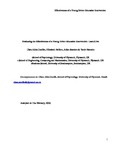Evaluating the effectiveness of a young driver-education intervention: Learn2Live
| dc.contributor.author | Cutello, CA | |
| dc.contributor.author | Hellier, E | |
| dc.contributor.author | Stander, Julian | |
| dc.contributor.author | Hanoch, Y | |
| dc.date.accessioned | 2020-02-23T14:11:15Z | |
| dc.date.available | 2020-02-23T14:11:15Z | |
| dc.date.issued | 2020-02 | |
| dc.identifier.issn | 1369-8478 | |
| dc.identifier.issn | 1873-5517 | |
| dc.identifier.uri | http://hdl.handle.net/10026.1/15396 | |
| dc.description.abstract |
Road traffic collisions are the leading cause of death among young adults, and behaviour change interventions play a key role in battling this public health concern. Road safety interventions are often educational and have traditionally relied on fear appeals to alter risky driving behaviour - yet there is a paucity of data regarding their effectiveness. Peer-education has been championed as an additional route to promoting safe driving behaviour. To examine these issues, this study evaluated the effectiveness of a fear appeal intervention in improving young drivers’ attitudes towards risky driving behaviour. A total sample of 800 high school and college students (16–20 years old) completed a similar set of questionnaires pre- and post-intervention and at a 3-month follow-up. Two different types of follow-up interventions were also compared: a peer-led and an expert-led road safety educational event. Measures evaluating attitudes towards risky driving behaviour were completed at all 3 time frames, and questions regarding the participants' perception of the follow-up event were asked. Overall, our data showed an improvement in attitudes towards risky driving behaviours both immediately after the intervention and three months later. These changes were especially evident among females. With regard to the follow-ups, both were effective in improving the attitudes towards risky driving. However, the peer-led event was preferred by the participants compared to the expert-led follow-up. | |
| dc.format.extent | 375-384 | |
| dc.language | en | |
| dc.language.iso | en | |
| dc.publisher | Elsevier BV | |
| dc.subject | Young drivers | |
| dc.subject | Road safety intervention | |
| dc.subject | Evaluation | |
| dc.subject | Peer-led education | |
| dc.subject | Risky driving | |
| dc.title | Evaluating the effectiveness of a young driver-education intervention: Learn2Live | |
| dc.type | journal-article | |
| dc.type | Journal Article | |
| plymouth.author-url | https://www.webofscience.com/api/gateway?GWVersion=2&SrcApp=PARTNER_APP&SrcAuth=LinksAMR&KeyUT=WOS:000521116000028&DestLinkType=FullRecord&DestApp=ALL_WOS&UsrCustomerID=11bb513d99f797142bcfeffcc58ea008 | |
| plymouth.volume | 69 | |
| plymouth.publication-status | Published | |
| plymouth.journal | Transportation Research Part F: Traffic Psychology and Behaviour | |
| dc.identifier.doi | 10.1016/j.trf.2020.02.009 | |
| plymouth.organisational-group | /Plymouth | |
| plymouth.organisational-group | /Plymouth/Admin Group - REF | |
| plymouth.organisational-group | /Plymouth/Admin Group - REF/REF Admin Group - FoSE | |
| plymouth.organisational-group | /Plymouth/Faculty of Science and Engineering | |
| plymouth.organisational-group | /Plymouth/Faculty of Science and Engineering/School of Engineering, Computing and Mathematics | |
| plymouth.organisational-group | /Plymouth/REF 2021 Researchers by UoA | |
| plymouth.organisational-group | /Plymouth/REF 2021 Researchers by UoA/EXTENDED UoA 10 - Mathematical Sciences | |
| plymouth.organisational-group | /Plymouth/REF 2021 Researchers by UoA/UoA10 Mathematical Sciences | |
| plymouth.organisational-group | /Plymouth/Users by role | |
| plymouth.organisational-group | /Plymouth/Users by role/Academics | |
| dcterms.dateAccepted | 2020-02-13 | |
| dc.rights.embargodate | 2021-2-21 | |
| dc.identifier.eissn | 1873-5517 | |
| dc.rights.embargoperiod | Not known | |
| rioxxterms.versionofrecord | 10.1016/j.trf.2020.02.009 | |
| rioxxterms.licenseref.uri | http://www.rioxx.net/licenses/all-rights-reserved | |
| rioxxterms.type | Journal Article/Review |


